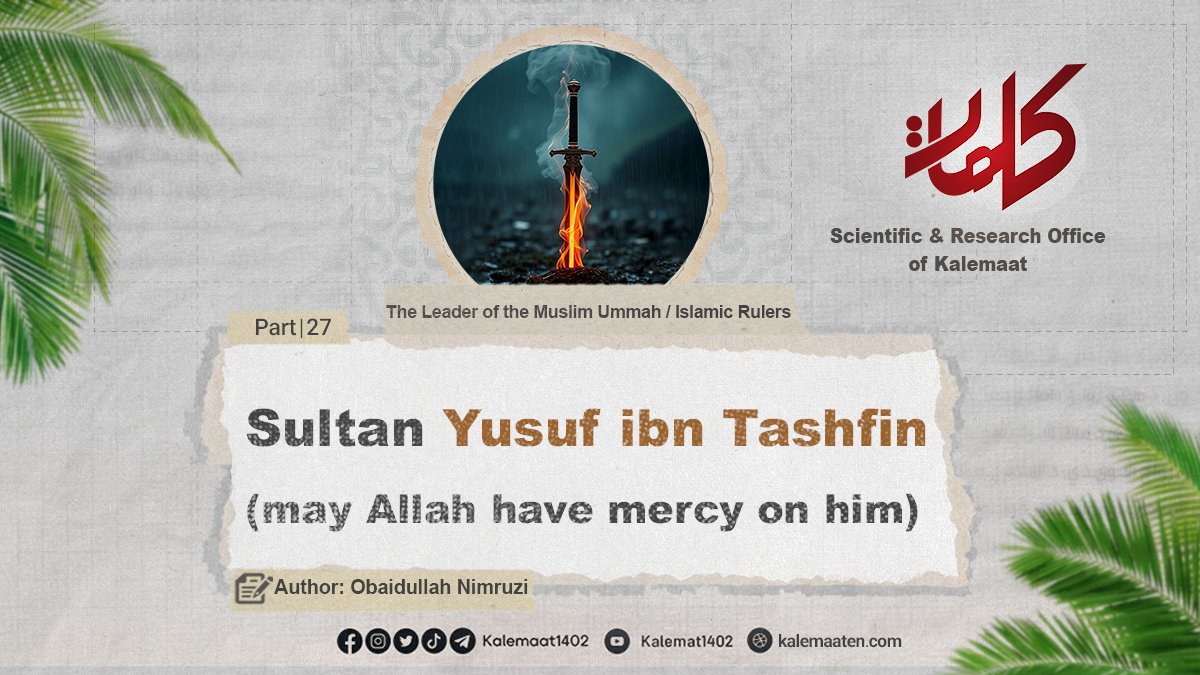
Author: Obaidullah Nimruzi
The Guardian of al-Andalus (Spain); Sultan Yusuf ibn Tashfin [MABH] (Part 27)
Extensive reforms and administrative divisions in the following years
This field trip was a proof of Yusuf ibn Tashfin’s sincerity towards the Islamic nation and that heavy responsibilities did not prevent him from showing compassion and direct attention to the people. As the Prophet said: “Whoever betrays his subjects will not smell the fragrance of Paradise.”
After the end of these visits, Yusuf once again returned to the main affairs of the government and continued the path of unification. In 465 AH, he captured the city of Al-Zamnah and Mount Al-Aludan. [1]
In 467 AH, he also annexed the mountains of Ghiyathah, Banu Makud, and Banu Rahayena to the Almoravid state. In the same year, he divided the country into several administrative divisions and selected their rulers from among the loyal Almoravid men. The divisions were as follows:
Fazat and Sir ibn Abi Bakr: ruler of the regions of Maknasa, Makalalah, and the surrounding areas;
Omar ibn Sulayman: ruler of Fez and the surrounding areas;
Dawoud ibn Ayesha: ruler of Sajlamasa and Daraa;
Tamim ibn Yusuf ibn Tashfin: ruler of the cities of Aghmat, Marrakesh, the regions of Sousse, Masada, Tadla, and Tamsina.
These divisions, which were made with the aim of serving the people and creating an efficient government structure, show that the Almoravids sought to build a society in which the people could confidently approve the course of the state’s domestic and foreign policies. This would have provided stability guaranteed by a powerful government with a clear law derived from the Quran, Sunnah, and authentic sources of jurisprudence.
Religious and social reforms; the neglected aspect of Almoravid rule
Although historians have written extensively about the military conquests of Yusuf ibn Tashfin and his military performance, only brief references are found to the social and cultural reforms of the Almoravids – and Yusuf himself; But if we consider that the principle of the Almoravids’ call was based on acting on the Book and the Sunnah, enjoining good and forbidding evil, and fighting corruption and deviation, we find that they always tried to implement the teachings of Islam in every place they entered.
In the city of Sajalmasah, they put affairs in order, dismantled the evils, destroyed musical instruments, burned down wine shops, removed oppressive taxes, and abolished all matters that were contrary to the Quran and Sunnah. [2]
Building society by eliminating manifestations of corruption and oppression
Yusuf ibn Tashfin adhered to this method throughout his reign. He fought against manifestations of corruption, closed down immoral and debauchery circles, and destroyed taverns, because he considered wine to be the mother of filth and vices. The source of laziness and irresponsibility in every society, he also abolished the oppression that was imposed on the people in the form of heavy taxes and levies.
In no part of his land, neither in the city nor in the desert, was there any unjust custom such as taxation, compulsory assistance or tribute, except for what the Quran and Sunnah had prescribed; such as zakat, tithe, the share of the Zimmi, khoms and the spoils of war. [3]
Yusuf ibn Tashfin; a man in a relentless fight against corruption
From various evidence and reasons, it can be clearly seen that Yusuf ibn Tashfin was a man intolerant and relentless against all manifestations of corruption. He was able to create a pure and innocent society free from the morality of the pre-Islamic era, a society that was far from the systems of oppression and tyranny, systems that are full of sins and the heavy burden of sins on the people’s shoulders, only to satisfy the lusts of the rulers, or to cover up their inability to defend the nation and protect the rights of the people.
Yusuf ibn Tashfin, who from the very beginning, had joined the ranks of the Almoravids with faith in Islamic principles, was able to make a profound impact on a society that reflected his spirit and personality because of this steadfastness and loyalty to the principles; because «الناسُ على دِینِ مُلُوکِهِم» Translation: “People are on the religion of their rulers.” This steadfastness and justice caused hearts to be eager to him before fortresses and walls, and the news of his justice and reforms spread throughout the Maghreb. People willingly and voluntarily joined his government one by one to free themselves from the oppression of rulers who followed human whims and laws, laws that were formulated solely for the interests of the ruling tribes or misguided political parties and tendencies; while Yusuf ibn Tashfin and his companions were based on the path of Sunnah and following the Imams of the Sharia. Therefore, the people of the Maghreb appealed to him and he opened their lands from east to west with the least effort. His subjects loved him and their affairs were organized. [4]
In the light of this policy arising from the ideals of the Muslim people, Yusuf ibn Tashfin’s glory grew, the call of the Almoravids spread throughout the Maghreb, stability and peace reigned, and society worked, produced, and prospered with joy and peace. Thanks to the great attention and support of Yusuf for the lands under his rule, life in the Almoravid lands flourished.
Continues…
References:
- Abu al-Abbas Ahmad ibn Khalid al-Nasiri, An Investigation of the News of the Countries of the Far Maghreb, Vol. 2, p. 31, Dar al-Kitab, 1997.
- Ibn Abi Zarh, Rawzat al-Qirtas, p. 81.
- Ibid, p. 88.
- al-Nuwayri, Nihayat al-Arab fi Funun al-Adab, Vol. 4, p. 262.



